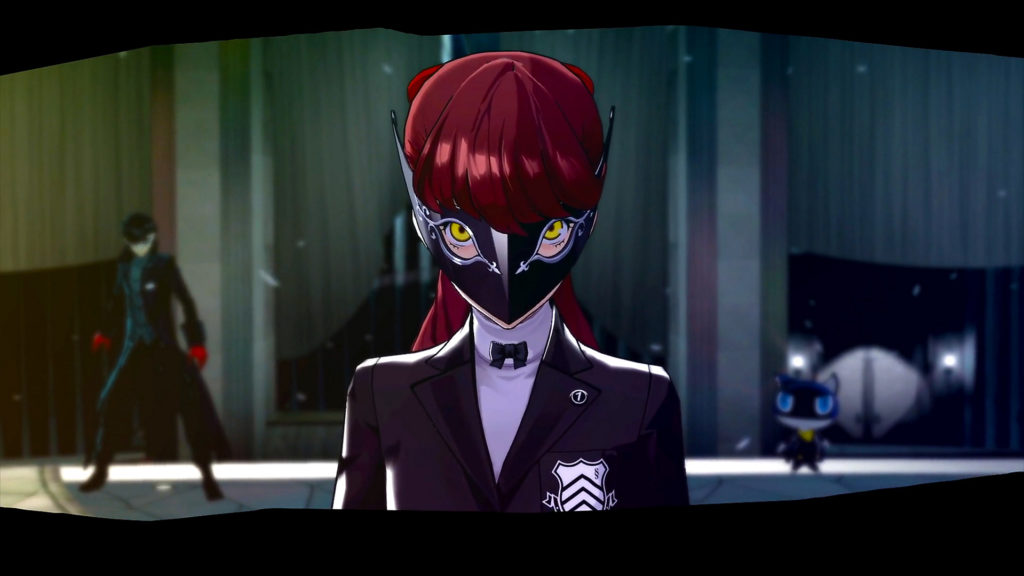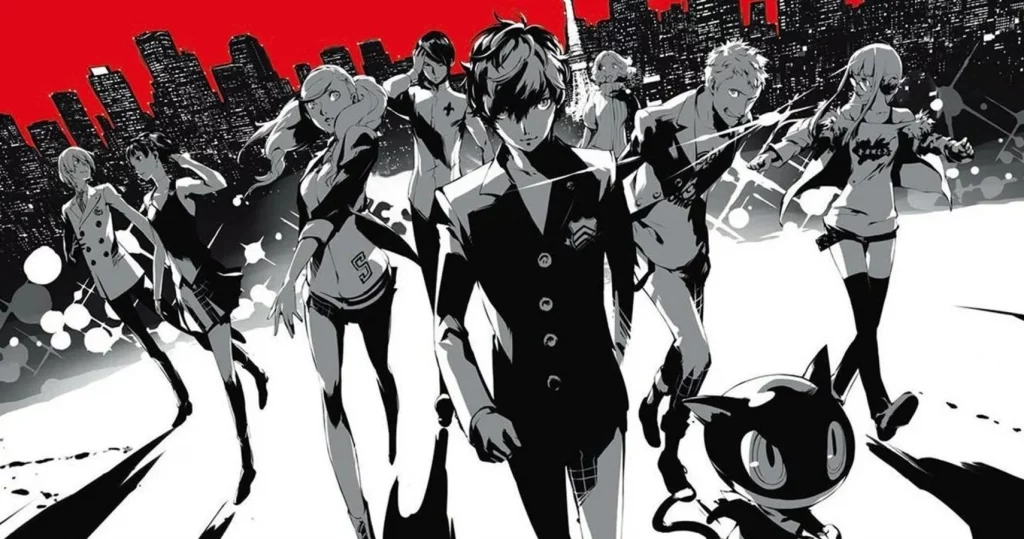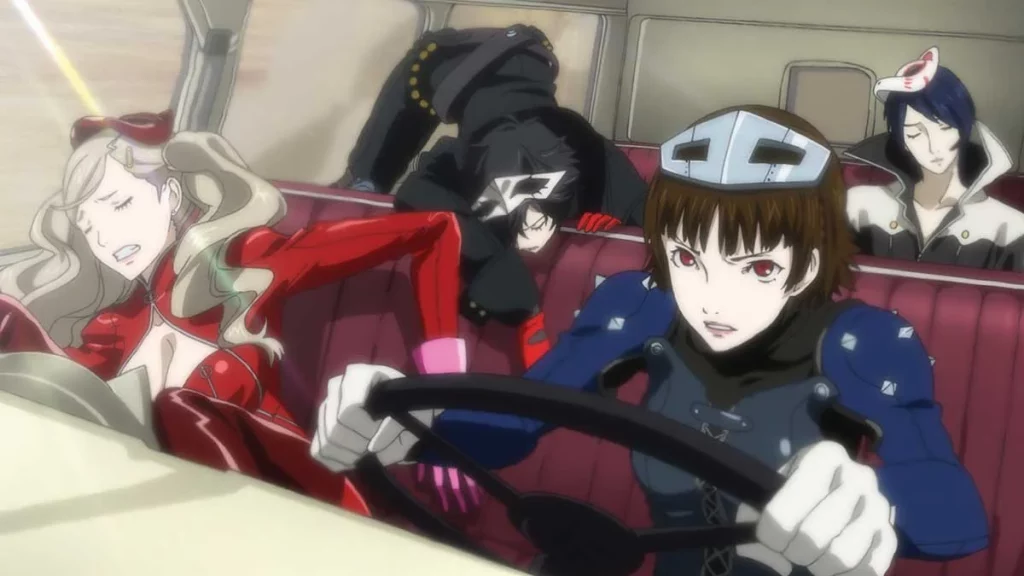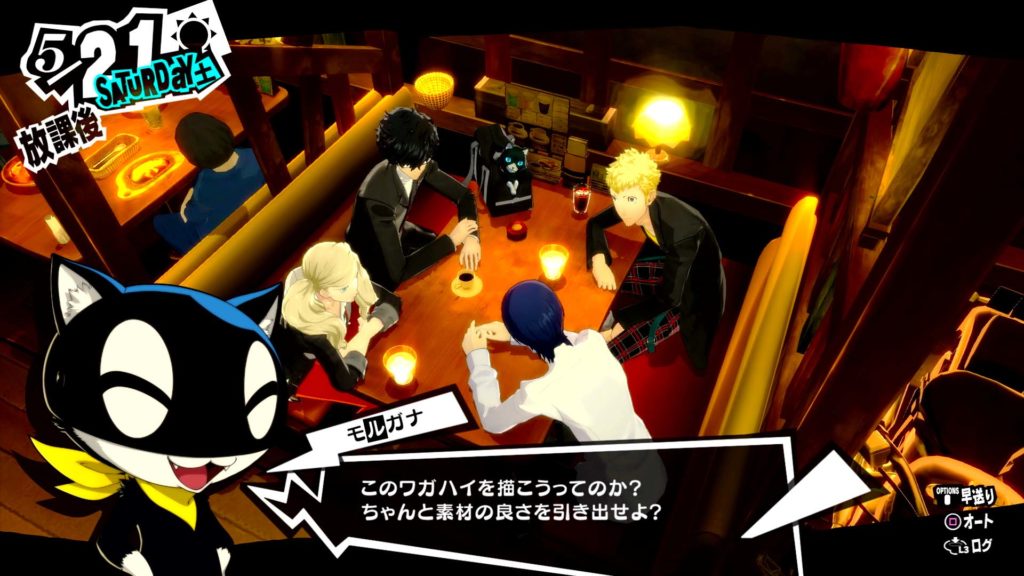The Maximum Spoilage series of writings is focused on discussing aspects of a game that would spoil said game to any normal person. Please continue reading at your own risksona. Note that this Maximum Spoilage entry also contains spoilers for the Mass Effect trilogy, in case you somehow haven’t either played or read about how terrible the ending is.

Persona 5 starts off with a bang. It ends with a whole ton of narrative confusion, meaningless (or even meaning-killing) twists, and the age-old “power of friendship” and “determination to move on” saving the day.
The first antagonist, Kamoshida, is arguably the best. He’s a former pro athlete turned high-school coach, and his reputation from his old job allows him to run roughshod over anyone else in the school, since it brings the school fame and money. You even directly witness the dire fallout of his abuse of female athletes. His motive is clear and his attitude throughout indicates he knows there will be no consequences to his actions. Once you find the magic mind-world, manage to overcome his mind’s defenses and “steal his heart” to change his attitude, he confesses publicly and goes to jail. Although the following minor arcs aren’t quite as strong as the first, the pattern of abuse -> dungeon -> triumph remains consistent.
During a roughly mid-game twist, one of the villains sabotages your operation on a target. Instead of confessing, midway through a news conference the target inexplicably dies. This doesn’t put as much of a damper as you would expect on things; your group of magic Phantom Thieves doesn’t seem to conceive of the possibility that your actions might have negative repercussions, and instead assumes (correctly, because this is a JRPG and we can’t accidentally hurt anyone) that someone else is working against you.

After taking down the vaguely-Trumpian Shido and the villain who sabotaged you earlier, the team anticipates a confession, but it never comes. Shido knew that his heart may be stolen and instructed his team to prevent him from making any public appearances and effectively present him as the same person he was without letting anyone else actually speak to him. Despite your ability to change him, he built up a mechanism to combat it. At this point Persona 5 could have swerved to a more realistic message – it’s not enough to magically beat up the personality of the bad guy, you need to actually start a movement, persuade people, and progress doesn’t just come through magical acts of personality change. You may be able to break free of the chains of society temporarily, but without actually changing society they can and will be reforged by the ambitious.
Instead, the big twist happens. You find out some jackhole god, Yaldabaoth, was spawned from the apathy of the people (this is the same damn plotline they’ve been reusing for 15 years), and has, confusingly, decided that humanity sucks because they fell prey to his magical apathy rays that have the power source of people’s apathy. He claims it was a game to see if you would take down Shido (you did), at which point it offers you a bargain you’re supposed to refuse, then flips over the table, declares the game moot, and uses even more powerful apathy rays (powered by humans’ apathy, mind) to try to fizzle you out of existence by making people disbelieve you exist. Naturally this doesn’t work, because of poorly justified Deus Ex Machina.
People who manipulate others can be satisfying villains. People who have physical power over others can be satisfying villains. I’ve never seen a satisfying villain who can mind-control others, particularly without any kind of rules. Look at how Mass Effect changed when Indoctrination went from “months of close exposure to a reaper” (ME1) to “this guy exists in the same galaxy as a reaper, and thus can be indoctrinated” (ME3, Udina specifically). Suddenly, any minor villain no longer has agency of their own, and any ally could become a foe because of “indoctrination.”

Likewise, a villain can have a simple motivation and still be fine. Even a creator-god who gets overtaken by his own creations can be somewhat satisfying. But when you have some orchestrator god who claims to have some complex higher motive that boils down to “I’m doing this because people are dumb, and I’m also making them dumb,” it’s frustating and feels insulting to the player. If there were a point, it becomes lost in the circular logic and is worse than being unexplained. Again – look at the Reapers’ motivation in Mass Effect, where the final reveal indicates their plan is “We’re robots killing sentient life, because sentient life always makes robots that kill them eventually and we want to do it before that happens.”
Ultimately, Persona 5 never seems to blame anyone for the emergence of this particularly douchey god. The individual arc villains are painted as a problem, but society at large suffers from apathy – and at one point in the late game, your allies realize that these villains were the few resisting Yaldabaoth’s influence. I’m not sure what point that twist has, other than possibly “being evil is better than being apathetic.” The events of the game indicate society at large is sick, but by having it also influenced by an evil god borne of that sickness, any message it wants to tell is lost. This feels like a particularly toothless view of society – “People are lazy or not taking responsibility, but we’re not going to bother going into causes (social change? technology? social media, which the game lampoons occasionally but never calls out?), and instead that sickness becomes a god you fight.”
Not taking a stand makes it unclear whether the writers pine for the old days, see this as somehow cyclical, despise media, or thought it was a fun setup for their “seven deadly sins” theme throughout the game (this one being Sloth). Atlus made a game where society holds most of the main cast back and then offers no meaningful criticism of society or advice to real people in similar situations.

Going a bit into previous entries in the series – in Persona 3, a numinous being called into reality was also caused by a form of apathy – a subconscious desire for death as an escape from the tedium of life. I feel like that was a better setup, given the way themes of death or coping with death show up throughout the story and in its FES followup (The Answer). In Persona 4, the collective desire that spawned the ultimate nemesis was similar – although there, the desire was to escape the tedium of daily life by living in a fake reality. This jibes pretty well with the media (specifically TV) themes throughout the game.
Although its predecessors used a lot of the same excuses for its world-ending godlike beings that your rag-tag group has to fend off, they jibe better with the themes of their games than Persona 5. The combination of its jarring finale with its derivative setup makes its conclusion doubly disappointing – not only is it mimicking its predecessors, but it doesn’t say anything new despite the game’s theme being otherwise a good setup for social criticism.


Candidly, I didn’t play Persona 5 Royal or Strikers and I doubt I will. Maybe Royal improves on it, but Golden mostly just added more confusion and unnecessary anime schlock to Persona 4 (though I loved the improved load times).
It’s really a shame since mechanically, P5 is great – integrating Social Links with more game mechanics was a cool twist – but Persona 3 was the only really innovative entry in years and now it’s largely inaccessible and would feel redundant to anyone who played 4 or 5 first.
I have yet to play P5 by virtue of not owning a compatible Playstation device, but the longer the years go on, the more I feel like maybe I’ll be okay missing out on it.
I used to ask myself whether jRPGs (and other anime-inspired genres) have such bad stories because the writers are bad, or because they are acting very deliberately to cater to a teenage audience (who, in my experience, enjoy stories that are as deep as a puddle as long as it sounds smart to them).
At this point, I feel like the answer is moot. All that does matter is that, yeah, a lot of games are just going to repeat the same themes over and over again, and rarely are they going to explore them in any way that’s satisfying or meaningful.
It doesn’t mean I’ve entirely written the genre off (though sometimes I get close!), but it does mean I have to turn off my brain and set expectations low.
I think the issue is that real answers are dangerous. Condemning governments, economies, systems, and cultures risks alienating people and check writers. The power of friendship may bore everyone but it also challenges nothing and so will always be a safe theme. Someone smarter than I should write about how there is an inherent capitalist outlook in the game mechanics of discreetly improving your relationship with each character in this series from 3 on.
Christian’s describing my thought process on playing P5. I liked 4 despite thinking it was basically a Japanese Porkies RPG. I don’t think I can do it again.
I’ve got to wonder how much of what feels trite and out of touch in JRPGness isn’t taken or received as such in the culture for which it was crafted. In my day job (tech for non-profit fundraising), we spend a lot of time thinking about the audience we’re trying to reach, and there’s a very real difference in perspective & effective communication when addressing different groups of people. It’s also very much expected in an American audience that there will be large variations between different people groups who will interact with the same experience. For younger and minority cohorts, there’s a strong affinity with the thought that if a person or organization isn’t taking a clear stand against a perceived threat, they are doing so for unethical reasons. Interestingly, this idea doesn’t have strong resonance with certain sizable groups of folks, making communicating ideas across multiple audiences even harder in our country.
With these aspects taken together, it makes perfect sense that for certain American players at least, leaving the underlying JRPG values of sacrifice and the power of friendship untouched and focusing on individual experience rather than critiquing root causes feels humdrum. I can’t say I’ve really played a Persona game since 3, but I’d be curious to know if reliance on conventional themes even in the midst of an otherwise modern and ‘hip’ game atmosphere don’t come across so creaky in the context they were intended for. I guess I want to believe that if a culture isn’t as directly concerned with root problems in underlying systems, and they can communicate more directly (though more opaquely for an outsider) to a largely homogenous populous, they may consider individual responsibility and integrating modern influences into traditional systems of more value & poignancy than social responsibility and pointing out the flaws in traditional systems. If you don’t think that tackling root causes is as important as taking responsibility for your own actions and holding others accountable for the same (certainly a theme in P3), it makes sense that the ‘why’ of what went wrong wouldn’t get billing time over the experiences the characters go through and their reactions to them.
That said, I certainly wouldn’t be that surprised if, like the rest of you mentioned, JRPGs are usually meant for an audience early enough in life that the themes presented can be timeworn from a historic context and yet still be meaningful to the intended audience. Does anybody here more familiar with the cultural context know if JRPG stories are opined and ‘eye-rolled’ as much in their native land as in English speaking territories?
I appreciate that perspective TrueTallus. To give an example in support of your thoughts, I’m a big fan of Gundam (It’s basically the only anime I have time for), and I listen to a podcast that does a lot of research into each show, film, etc, specifically drilling down into the context and culture in which each was made. They discuss differences in translation, who worked on them, what was going on in Japan at the time of production, and more.
I recently finished their series of episodes on War in the Pocket, an OVA from 1989. It’s a fantastic story, one of my very favorites, because it does a great job of portraying the costs of war on the civilian population. But thanks to the podcast and its research, I now know that the story also has a lot of commentary about the Japanese Bubble economy, and is also shaped by the fact that most of the production staff grew up when the Vietnam War was going on (and with American bases in Japan, some of them even got a highly filtered impression of American GI’s at the time).
Those are things I never considered, but now that I know about them, I can now “see” it when I watch War in the Pocket. And now I wonder what else I might be missing in other stories.
That being said, I also believe that the commercial aspect is as strong, or stronger, when it comes to shaping these stories. I remember reading an essay years ago in which a writer had a chance to have dinner with the then-president of Square Enix. He felt disillusioned with newer Final Fantasy games, and said as much to the president. His response – “well, we make things that we know teenagers will like”. In other words, it wasn’t that the games were changing, but the writer himself was.
I think of that story when I look at Persona in particular. Three games in a row that are in some ways about the apathy and cruelty of adults. Setting aside the fact that P3 and P4 both came out within a few years of each other, there’s an argument to be made that Atlus is pulling a Final Fantasy, presenting the same themes to different generations of teenagers.
(Or for another counter example, look at how much Young Adult fiction in the west revolves around vampires and the supernatural, and then look at how much Anime revolves around the same. For as much as cultural differences may explain it, in some cases there are also themes, gimmicks, etc that may be universally beloved by people of a certain age).
Thanks for the thoughts, everyone!
1 – I have to concede I’m probably older than the target audience for Persona 5, and I’m really thinking it’s probably not a series that is “for me” anymore. When I played P3 at 23 – it felt pretty cool, and maybe it’s time to accept that in my mid-thirties a game that has the same kind of message rings hollow. It’s also clear to me that the games are targeted to Japan where social criticism is going to be less accepted/common. I’m not aware of whether these stories are considered trite there. But I do still think there were a lot of missed opportunities here.
2 – I recently finished Shin Megami Tensei 5, and without spoiling anything (in the context of Christian’s comments), I read an analysis that points out that SMT5 is essentially about anxiety around an impending fall of western liberal capitalism. I’m not perceptive enough (or don’t have the context) to have noticed that myself, and actually I think their drive to be consistent with that theme makes the story feel lifeless and deliberately vague without that context.
There are probably deeper thoughts in Persona 5 than I’m willing to give it credit for, even if on the surface it doesn’t say anything beyond, as TrueTallus mentioned in respect to Persona 3, “Take responsibility for your actions and hold others accountable for theirs”. I do think as Christian pointed out there is a strong drive for a commercially palatable story, especially after Persona broke into the mainstream (one reason I think 3 is more consistent with its themes, while 4 is so saccharine, is the desire for broader appeal).
/edit / followup – I meant to bring up the Wild Arms series, which started as a set of environmentalist stories (the second was a critique of nuclear weapons) and ended up somehow progressing into an incredibly infantile “All adults are bad, actually” pattern that says largely the same things as Persona 3-5.
At some point it’s clear the audience changed, but I feel like the stories have gotten both less subtle and more alike. At some point, the early games resonated enough to reach audiences.
Thanks for the further thoughts and feedback Christian and Chris! I only have a thimblefull of real knowledge of Gundam, Christian, so maybe I’ll give ‘War in the Pocket’ a gander (let me know if there’s a better jumping in point). Chris, Wild Arms also came to mind for me as well, though maybe WA4 is what happens when you’re always determined to say SOMETHING, even when you don’t really need to.
It’s certain that the ‘point’ of most JRPGs, at least from the perspective of the people who invest in them, is to make a profit, so I can’t deny that those sorts of considerations are often at the forefront. Chasing people’s money doesn’t HAVE to mean avoiding saying something meaningful, though. From my own personal perspective, the focus on individual journeys in JRPGs have provided genuinely valuable self reflection, motivation and (to a lesser extent) alternate points of view. I admit that I tend to be more strongly engaged with the idea of advocating for changes in my own behavior than in pondering how best to change the inner workings of the systems that are in place, so I’m probably in a sweet spot for finding JRPG musings engaging. Even something like Ys, where the story is much less the focus than the action, can have characterization that’s worth pondering, as long a sincere and cohesive effort has been made.
All that said, though, I certainly agree with you Chris that a lot of the material covered in JRPs feels like a retread of things that have already been explored. When I’m feeling positive, I can think of these as a way to re-communicate ideals to a new audience in a way they find engaging, but it certainly doesn’t take much of an off day to see a lot things as low effort pantomime.
Is anybody here well versed in Tails games? By the look of it, Tails of Arise seemed to be treading some new waters (for JRPGs at least), and I remember hearing the series referenced occasionally as different games had unusual characters and takes on circumstances. My own Tails experience is pretty limited – I played Tails of…Something… with the guy with two swords wearing the Rockateer jacket and the girl turning into an angel, but it’s been too long, and I mostly only played it because my Gamecube was lonely and it looked a bit like Star Ocean :)
TrueTallus – War in the Pocket is a great starting point.
Anyway, your latest comment got me thinking about older jRPGs. I think there’s an argument to me made that at some point in time, they had more teeth, or were at least trying to be more interesting.
***** WARNING THE REST OF THIS POST HAS SPOILERS FOR 30+ YEAR OLD GAMES !!!!!*******
******************************************************************************************
Many of these stories are primitive, but they’re willing to be dark and/or touch upon themes that aren’t specifically targeted towards children or teenagers. My guess is that maybe, just maybe, the people making these games felt less of a pressure to cater to demographics, and had a bit more creative freedom.
My other pet theory is that Final Fantasy IV was a turning point. That’s a game in which multiple people “die”, but ultimately all but one are revealed to be alive by the end. It has no teeth whatsoever (though in its defense, its main character is an adult, with a lover, so it’s got that going for it).